446 scholarly books by Seagull Books and 12
start with E
446 scholarly books by Seagull Books and 12
446 scholarly books by Seagull Books
12 start with E start with E
12 start with E start with E
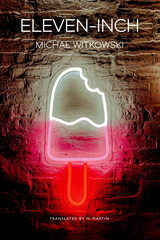
Eleven-Inch
Michal Witkowski
Seagull Books, 2021
What does it take to succeed as a queer teenage Eastern European sex worker in the 1990s? Eleven inches and a ruthless attitude.
Western Europe, shortly after the fall of the Berlin Wall: Two queer teens from Eastern Europe journey to Vienna, then Zurich, in search of a better life as sex workers. They couldn’t be more different from each other. Milan, aka Dianka, a dreamy, passive naïf from Slovakia, drifts haplessly from one abusive sugar daddy to the next, whereas Michał, a sanguine pleasure-seeker from Poland, quickly masters the selfishness and ruthlessness that allow him to succeed in the wild, capitalist West—all the while taking advantage of the physical endowment for which he is dubbed “Eleven-Inch.” By turns impoverished and flush with their earnings, the two traverse a precarious new world of hustler bars, public toilets, and nights spent sleeping in train stations and parks or in the opulent homes of their wealthy clients. With campy wit and sensuous humor, Michał Witkowski explores in Eleven-Inch the transition from Soviet-style communism to neoliberal capitalism in Europe through the experiences of the most marginalized: destitute queers.
Western Europe, shortly after the fall of the Berlin Wall: Two queer teens from Eastern Europe journey to Vienna, then Zurich, in search of a better life as sex workers. They couldn’t be more different from each other. Milan, aka Dianka, a dreamy, passive naïf from Slovakia, drifts haplessly from one abusive sugar daddy to the next, whereas Michał, a sanguine pleasure-seeker from Poland, quickly masters the selfishness and ruthlessness that allow him to succeed in the wild, capitalist West—all the while taking advantage of the physical endowment for which he is dubbed “Eleven-Inch.” By turns impoverished and flush with their earnings, the two traverse a precarious new world of hustler bars, public toilets, and nights spent sleeping in train stations and parks or in the opulent homes of their wealthy clients. With campy wit and sensuous humor, Michał Witkowski explores in Eleven-Inch the transition from Soviet-style communism to neoliberal capitalism in Europe through the experiences of the most marginalized: destitute queers.
[more]

The Emperor
Makenzy Orcel
Seagull Books, 2024
A tragicomic novel that explores deep-seated tensions and social violence in Haiti.
After committing an irreparable crime, the narrator of The Emperor waits in his bedroom for the police to arrest him. His past reverberates inside of him like a drum: his youth spent in captivity as a zonbi, under the control of a charlatan Vodou leader, and many an alienating dawn delivering the daily newspaper through the cutthroat neighborhoods of Port-au-Prince, Haiti. He now has blood on his hands because of the woman on the bus—the only woman he had ever loved.
Part crime fiction, part fable gone awry, The Emperor invites readers to follow the narrator’s life as he moves from the Haitian countryside to the sprawling city, learning about the corruptible nature of power in his quest for freedom. Along the way, Makenzy Orcel blends the marvelous with the real by introducing readers to an unforgettable cast of characters including the Very Old Sheep, a deceitful Emperor, and the narrator’s so-called Enlightened Colleague. Written with Orcel’s distinctive verve, this novel offers readers a story set in contemporary Haiti that is rich in poetry and full of narrative intrigue.
After committing an irreparable crime, the narrator of The Emperor waits in his bedroom for the police to arrest him. His past reverberates inside of him like a drum: his youth spent in captivity as a zonbi, under the control of a charlatan Vodou leader, and many an alienating dawn delivering the daily newspaper through the cutthroat neighborhoods of Port-au-Prince, Haiti. He now has blood on his hands because of the woman on the bus—the only woman he had ever loved.
Part crime fiction, part fable gone awry, The Emperor invites readers to follow the narrator’s life as he moves from the Haitian countryside to the sprawling city, learning about the corruptible nature of power in his quest for freedom. Along the way, Makenzy Orcel blends the marvelous with the real by introducing readers to an unforgettable cast of characters including the Very Old Sheep, a deceitful Emperor, and the narrator’s so-called Enlightened Colleague. Written with Orcel’s distinctive verve, this novel offers readers a story set in contemporary Haiti that is rich in poetry and full of narrative intrigue.
[more]
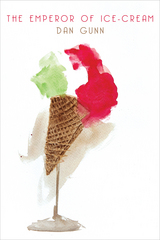
The Emperor of Ice-Cream
Dan Gunn
Seagull Books, 2014
In The Emperor of Ice-Cream, we are introduced to Lucia. Now in her eighties, this daughter of Italian immigrants looks back on her youth spent in Scotland during the 1920s and 30s. She remembers her three brothers, Dario, Giulio and Emilio, and the very different ways they lived through these decades: the eldest establishes the Edinburgh Fascist club, the second sets up a luxurious ice-cream parlor, the youngest hones his verbal skills for a future as a poet. Lucia learns what it is to be an immigrant and to wonder where ‘home’ is; she encounters religious sectarianism, idealism, and disillusionment. She experiences passion, hope, and disappointment.
When she falls in love in Rome, it appears that happiness is Lucia’s for the asking, until unstoppable forces intervene—in both of her countries. With mounting tension, her tale leads through the rise of Fascism to the terrible moment in June 1940 when Mussolini declares war, and British Italians are interned. When hundreds are herded as ‘enemy aliens’ onto a ship bound for exile, among their number are two of her brothers. Determined to tell their story before it is too late, Lucia gives an account of one of the most shameful episodes in Britain’s Second World War.
Through his portrayal of Lucia’s singular vision and voice, Dan Gunn has created an unforgettable character who, while registering the buffets of history, is—just possibly—writing herself toward some overdue inner peace.
When she falls in love in Rome, it appears that happiness is Lucia’s for the asking, until unstoppable forces intervene—in both of her countries. With mounting tension, her tale leads through the rise of Fascism to the terrible moment in June 1940 when Mussolini declares war, and British Italians are interned. When hundreds are herded as ‘enemy aliens’ onto a ship bound for exile, among their number are two of her brothers. Determined to tell their story before it is too late, Lucia gives an account of one of the most shameful episodes in Britain’s Second World War.
Through his portrayal of Lucia’s singular vision and voice, Dan Gunn has created an unforgettable character who, while registering the buffets of history, is—just possibly—writing herself toward some overdue inner peace.
[more]
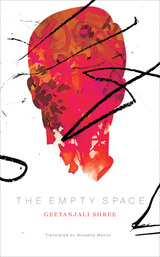
The Empty Space
Geetanjali Shree
Seagull Books, 2016
When a bomb explodes in a university cafe, nineteen students are killed. The Empty Space begins with the identification of these slain students. Slowly, each individual is claimed and taken away for a proper burial by their mourning family members. The final mother to enter the cafe identifies the nineteenth body as her eighteen-year-old son and brings him home in a casket. She not only brings home her dead son, though, but also the sole survivor of the blast, a three-year-old boy. By a strange quirk of fate, after the explosion he is found lying in a small empty space, alive and breathing. The Empty Space chronicles the memories of the boy dead, the story of the boy brought home, and the cataclysmic crossing of life and death.
[more]
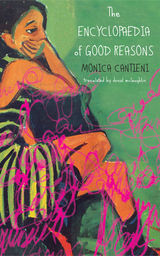
The Encyclopaedia of Good Reasons
Monica Cantieni
Seagull Books, 2014
“My father bought me from the council for 365 francs,” recalls the narrator in Monica Cantieni’s novel The Encyclopaedia of Good Reasons. She’s a young girl, an immigrant to Switzerland whose adoption is yet to be finalized. When she finally moves into her new home with her new family, she recounts her days in the orphanage and how starkly different her life is now. Her new community speaks German, a language foreign to her, and she collects words and phrases in matchboxes. Though her relationship with her adoptive parents is strained, she bonds with her adoptive grandfather Tat, and together they create the eponymous “Encyclopaedia of Good Reasons.”
Set in the time of the crucial 1970 Swiss referendum on immigration, Monica Cantieni introduces us to a host of colorful characters who struggle to make Switzerland their home: Eli, the Spanish bricklayer; Toni, the Italian factory worker with movie star looks; Madame Jelisaweta, the Yugoslav hairdresser; and Milena, the mysterious girl in the wardrobe. This is a book with a very warm heart, and rarely has a young girl’s narrative been at once so uproariously hilarious and so deeply moving.
Set in the time of the crucial 1970 Swiss referendum on immigration, Monica Cantieni introduces us to a host of colorful characters who struggle to make Switzerland their home: Eli, the Spanish bricklayer; Toni, the Italian factory worker with movie star looks; Madame Jelisaweta, the Yugoslav hairdresser; and Milena, the mysterious girl in the wardrobe. This is a book with a very warm heart, and rarely has a young girl’s narrative been at once so uproariously hilarious and so deeply moving.
[more]
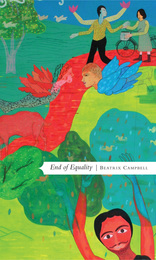
End of Equality
Beatrix Campbell
Seagull Books, 2013
Among liberal thinkers, there is an optimistic belief that men and women are on a cultural journey toward equality—in the workplace, on the street, and in the home. But observation and evidence both tell us that in many ways this progress has stopped and in some cases, even reversed.
In TheEnd of Equality, renowned feminist Beatrix Campbell argues that even as the patriarchy has lost some of its legitimacy, new inequalities are emerging in our culture. We are living, Campbell writes, in an era of neo-patriarchy in which violence has proliferated; body anxiety and self-hatred have flourished; rape is committed with impunity; sex trafficking thrives, and the struggle for equal pay is at an end. After four decades observing society, Campbell still speaks of the long-sought goal of gender equality. But now she calls for a new revolution.
[more]
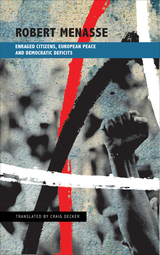
Enraged Citizens, European Peace and Democratic Deficits
Or Why the Democracy Given to Us Must Become One We Fight For
Robert Menasse
Seagull Books, 2016
In 2010, Robert Menasse journeyed to Brussels to begin work on a novel centered on the European Union. His extended stay resulted in a completely different book—Enraged Citizens, European Peace and Democratic Deficits, a work of nonfiction examining the history of the European project and the evolving politics of nation-states.
Spanning from the beginning of the transnational idea with 1951’s Montanunion—the European Coal and Steel Community—to the current financial crisis, Menasse focuses on the institutional structures and forces both advancing and obstructing the European project. Given the internal tensions among the European Commission, Parliament, and Council, Menasse argues that current problems that are frequently misunderstood as resulting from the financial crisis are, in fact, political. Along the way, he makes the bold claim that either the Europe of nation-states will perish—or the project of transcending the nation-states will.
A provocative book, Enraged Citizens, European Peace and Democratic Deficits deftly analyzes the financial and bureaucratic structures of the European Union and sheds much-needed light on the state of the debt crisis. Menasse brings his considerable literary expertise to the unraveling of the real state of the Union, along the way weaving an intriguing tale of one continent’s efforts to become a truly postnational democracy.
Spanning from the beginning of the transnational idea with 1951’s Montanunion—the European Coal and Steel Community—to the current financial crisis, Menasse focuses on the institutional structures and forces both advancing and obstructing the European project. Given the internal tensions among the European Commission, Parliament, and Council, Menasse argues that current problems that are frequently misunderstood as resulting from the financial crisis are, in fact, political. Along the way, he makes the bold claim that either the Europe of nation-states will perish—or the project of transcending the nation-states will.
A provocative book, Enraged Citizens, European Peace and Democratic Deficits deftly analyzes the financial and bureaucratic structures of the European Union and sheds much-needed light on the state of the debt crisis. Menasse brings his considerable literary expertise to the unraveling of the real state of the Union, along the way weaving an intriguing tale of one continent’s efforts to become a truly postnational democracy.
[more]
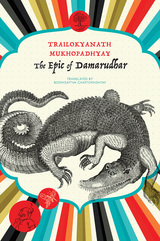
The Epic of Damarudhar
Trailokyanath Mukhopadhyay
Seagull Books, 2020
Originally published between 1910 and 1917, and collected in book form in 1923, The Epic of Damarudhar story cycle occupies an important and unique position in the history of Bengali literature. Tackling cosmology and mythology, class and caste abuse, nativist demagoguery and the harsh reality of rural poverty, all by means of unrelentingly fierce black comedy, Trailokyanath Mukhopadhyay’s cycle of seven stories featuring the raconteur Damarudhar remains prescient social commentary to this day.
With its generic fusion of tall tales, science, myth, politics, and the absurd, the work also announces the emergence of the genre of modern fantasy in Bengal. A detailed introduction, bibliography, and extensive annotation bring to life the context for these stories, highlighting key intertexts, political nuances, and important mythological references. This volume also contains the first translation of a rare biographical piece on the author, which includes long autobiographical parts written by Trailokyanath himself. Carefully translated and thoroughly researched, this volume will introduce a trenchant Indian voice to the English-language readership.
With its generic fusion of tall tales, science, myth, politics, and the absurd, the work also announces the emergence of the genre of modern fantasy in Bengal. A detailed introduction, bibliography, and extensive annotation bring to life the context for these stories, highlighting key intertexts, political nuances, and important mythological references. This volume also contains the first translation of a rare biographical piece on the author, which includes long autobiographical parts written by Trailokyanath himself. Carefully translated and thoroughly researched, this volume will introduce a trenchant Indian voice to the English-language readership.
[more]
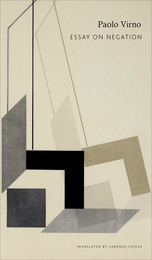
An Essay on Negation
For a Linguistic Anthropology
Paolo Virno
Seagull Books, 2018
A vital addition to Seagull’s growing Italian List that focuses on leftist Italian thought, bringing famous as well as little-known yet crucial voices into the English language.
As speaking animals, we continuously make use of an unassuming grammatical particle, without suspecting that what is at work in its inconspicuousness is a powerful apparatus, which orchestrates language, signification, and the world at large. What particle might this be? The word not.
In Essay on Negation, Paolo Virno argues that the importance of the not is perhaps comparable only to that of money—that is, the universality of exchange. Negation is what separates verbal thought from silent cognitive operations, such as feelings and mental images. Speaking about what is not happening here and now, or about properties that are not referable to a given object, the human animal deactivates its original neuronal empathy, which is prelinguistic; it distances itself from the prescriptions of its own instinctual endowment and accesses a higher sociality, negotiated and unstable, which establishes the public sphere. In fact, the speaking animal soon learns that the negative statement does not amount to the linguistic double of unpleasant realities or destructive emotions: while it rejects them, negation also names them and thus includes them in social life. Virno sees negation as a crucial effect of civilization, one that is, however, also always exposed to further regressions. Taking his cue from a humble word, the author is capable of unfolding the unexpected phenomenology of the negating consciousness.
As speaking animals, we continuously make use of an unassuming grammatical particle, without suspecting that what is at work in its inconspicuousness is a powerful apparatus, which orchestrates language, signification, and the world at large. What particle might this be? The word not.
In Essay on Negation, Paolo Virno argues that the importance of the not is perhaps comparable only to that of money—that is, the universality of exchange. Negation is what separates verbal thought from silent cognitive operations, such as feelings and mental images. Speaking about what is not happening here and now, or about properties that are not referable to a given object, the human animal deactivates its original neuronal empathy, which is prelinguistic; it distances itself from the prescriptions of its own instinctual endowment and accesses a higher sociality, negotiated and unstable, which establishes the public sphere. In fact, the speaking animal soon learns that the negative statement does not amount to the linguistic double of unpleasant realities or destructive emotions: while it rejects them, negation also names them and thus includes them in social life. Virno sees negation as a crucial effect of civilization, one that is, however, also always exposed to further regressions. Taking his cue from a humble word, the author is capable of unfolding the unexpected phenomenology of the negating consciousness.
[more]
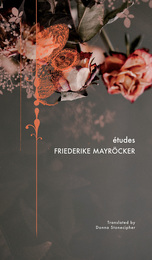
études
Friederike Mayröcker
Seagull Books, 2019
A diary-like sequence of poems from one of Austria’s best-known contemporary voices.
Exploring longing, lust for life, aging, mortality, grief, and flowers in her inimitable late style, études is a diary-like sequence of poems by one of the greatest living Austrian poets. Friederike Mayröcker’s almost daily entries give us a unique view into the interplay between desire and her motivation for writing. In Mayröcker’s case, she writes both to keep a vanished world present and to exploit the possibilities of being present for constant experimentation.
The poems in this volume are not only studies of how the mind works, moving from fragment to fragment, but also experiments with techniques of repetition, typography, collage, and quotation. Mayröcker transforms the humble page into spaces of radical openness. After all, she says, a poem is that which “opens everything up.” Each poem is date-stamped, and each date acts as a kind of permission for Mayröcker to pour in everything from notes on doctor’s visits to gorgeously structured elegies to obsessively repeating fragments of memory that act upon the whole like bits of recurring melody.
Rarely before has the intimate process of writing been so exquisitely laid bare than in études. Traversing the boundaries of literary forms with Mayröcker’s distinctive style, this important volume strikes an admirable balance between playfulness and serious inquiry.
Exploring longing, lust for life, aging, mortality, grief, and flowers in her inimitable late style, études is a diary-like sequence of poems by one of the greatest living Austrian poets. Friederike Mayröcker’s almost daily entries give us a unique view into the interplay between desire and her motivation for writing. In Mayröcker’s case, she writes both to keep a vanished world present and to exploit the possibilities of being present for constant experimentation.
The poems in this volume are not only studies of how the mind works, moving from fragment to fragment, but also experiments with techniques of repetition, typography, collage, and quotation. Mayröcker transforms the humble page into spaces of radical openness. After all, she says, a poem is that which “opens everything up.” Each poem is date-stamped, and each date acts as a kind of permission for Mayröcker to pour in everything from notes on doctor’s visits to gorgeously structured elegies to obsessively repeating fragments of memory that act upon the whole like bits of recurring melody.
Rarely before has the intimate process of writing been so exquisitely laid bare than in études. Traversing the boundaries of literary forms with Mayröcker’s distinctive style, this important volume strikes an admirable balance between playfulness and serious inquiry.
[more]
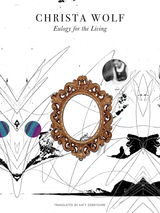
Eulogy for the Living
Taking Flight
Christa Wolf
Seagull Books, 2018
A fragmentary work that stands as a testament to Wolf's skill as a thinker, storyteller, and memorializer of humanity’s greatest struggles.
Christa Wolf tried for years to find a way to write about her childhood in Nazi Germany. In her 1976 book Patterns of Childhood, she explained why it was so difficult: “Gradually, over a period of months, the dilemma has emerged: to remain speechless or to live in the third person, these seem to be the options. One is impossible, the other sinister.” During 1971 and 1972 she made thirty-three attempts to start the novel, abandoning each manuscript only pages in. Eulogy for the Living, written over the course of four weeks, is the longest of those fragments. In its pages, Wolf recalls with crystalline precision the everyday details of her life as a middle-class grocer’s daughter, and the struggles within the family—struggles common to most families, but exacerbated by the rise of Nazism. And as Nazism fell, the Wolfs fled west, trying to stay ahead of the rampaging Red Army.
Christa Wolf tried for years to find a way to write about her childhood in Nazi Germany. In her 1976 book Patterns of Childhood, she explained why it was so difficult: “Gradually, over a period of months, the dilemma has emerged: to remain speechless or to live in the third person, these seem to be the options. One is impossible, the other sinister.” During 1971 and 1972 she made thirty-three attempts to start the novel, abandoning each manuscript only pages in. Eulogy for the Living, written over the course of four weeks, is the longest of those fragments. In its pages, Wolf recalls with crystalline precision the everyday details of her life as a middle-class grocer’s daughter, and the struggles within the family—struggles common to most families, but exacerbated by the rise of Nazism. And as Nazism fell, the Wolfs fled west, trying to stay ahead of the rampaging Red Army.
[more]
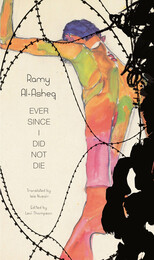
Ever Since I Did Not Die
Ramy Al-Asheq
Seagull Books, 2021
Through seventeen powerful testimonies, Syrian-Palestinian poet Ramy Al-Asheq's Ever SInce I Did Not Die is a poignant autobiographical journey that vividly depicts what it means to live through war.
The texts gathered in Ever Since I Did Not Die by Syrian-Palestinian poet Ramy Al-Asheq are a poignant record of a fateful journey. Having grown up in a refugee camp in Damascus, Al-Asheq was imprisoned and persecuted by the regime in 2011 during the Syrian Revolution. He was released from jail, only to be recaptured and imprisoned in Jordan. After escaping from prison, he spent two years in Jordan under a fake name and passport, during which he won a literary fellowship that allowed him to travel to Germany in 2014, where he now lives and writes in exile.
Through seventeen powerful testimonies, Ever Since I Did Not Die vividly depicts what it means to live through war. Exquisitely weaving the past with the present and fond memories with brutal realities, this volume celebrates resistance through words that refuse to surrender and continue to create beauty amidst destruction—one of the most potent ways to survive in the darkest of hours.
The texts gathered in Ever Since I Did Not Die by Syrian-Palestinian poet Ramy Al-Asheq are a poignant record of a fateful journey. Having grown up in a refugee camp in Damascus, Al-Asheq was imprisoned and persecuted by the regime in 2011 during the Syrian Revolution. He was released from jail, only to be recaptured and imprisoned in Jordan. After escaping from prison, he spent two years in Jordan under a fake name and passport, during which he won a literary fellowship that allowed him to travel to Germany in 2014, where he now lives and writes in exile.
Through seventeen powerful testimonies, Ever Since I Did Not Die vividly depicts what it means to live through war. Exquisitely weaving the past with the present and fond memories with brutal realities, this volume celebrates resistance through words that refuse to surrender and continue to create beauty amidst destruction—one of the most potent ways to survive in the darkest of hours.
[more]
READERS
Browse our collection.
PUBLISHERS
See BiblioVault's publisher services.
STUDENT SERVICES
Files for college accessibility offices.
UChicago Accessibility Resources
home | accessibility | search | about | contact us
BiblioVault ® 2001 - 2024
The University of Chicago Press









